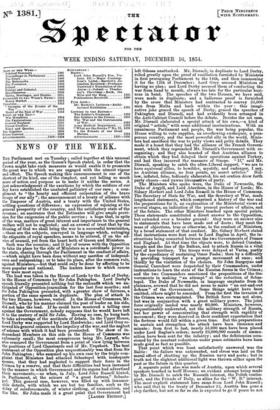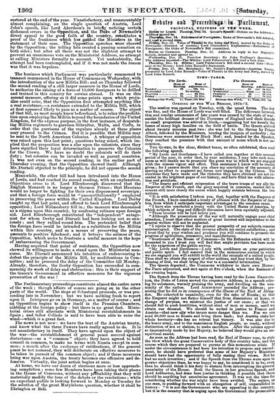NEWS OF THE WEEK.
THE Parliament met on Tuesday ; called together at this unusual period of the year, as the Queen's Speech stated, in order that the Crown might take such measures as would enable it to prosecute the great war in which we are engaged with the utmost vigour and effect. The Speech making this announcement is one of the shortest of its kind, one of the simplest, and yet telling so much more of action and purpose as to make it unlike the series. A just acknowledgment of the exertions by which the soldiers of our day have established the unabated gallantry of our race ; a com- pliment to "the hearty and efficient cooperation of the brave troops of our ally"; the announcement of a treaty of alliance with the Emperor of Austria, and a treaty with the United States, settling questions of difference; an expression of rejoicing at the general prosperity of the country, and the satisfactory state of the revenue ; an assurance that the Estimates will give ample provi- sion for the exigencies of the public service ; a hope that, in spite of the war, matters of great interest and importance to the general welfare will not be neglected; and an avowal of trust that by the blessing of God we shall bring the war to a successful termination, —these are the subjects, conveyed in language which, outraging the etiquette of royal speeches, seems to be uttered, if on the ad- vice of council, yet from the heart both of Queen and Ministers.
Such was the occasion; and it lay of course with the Opposition to take its place by the side of Ministers as a coordinate power in the state, sharing through the Parliament in the conduct of affairs, —which might have been done without any sacrifice of independ- ence and outspeaking; or to take its place, after the common rule against Ministers —but that could only be done by affecting to be more popular and national. The leaders knew to whioh course they were most equal. The lead was taken in the House of Lords by the Earl of Derby, in the House of Commons by Sir John Pakington. Lord Derby's speech literally presented nothing but the rechauffe which we an- ticipated of Opposition-journalism for the last four months ; and Sir John Pakington presented, with a greater show of fairness, a portion of the same speech in duplicate. The plan of attack in the two Houses, however, varied. In the House of Commons, Mr. Disraeli, who by his manner claimed the post of leader on his side, did not take the lead. If he could have mustered a telling case against the Government, nobody supposes that he would have left it to the oratory of mild Sir John. Having no case, he hung back to take advantage of the accidents of debate. In the Upper House, Lord Derby was supported by Lord Hardwicke; and Lord Grey re- newed hie general censure on the impolicy of the war, and the neglect of science with which it had been prosecuted. The show of in- dependent Members on this side in the House of Commons was extremely small; the most conspicuous being Mr. Layard, who also censured the Government from a point of view lying between the positions of Lord Clanricarde and of Mr. Urquhart. The best statement of the Opposition plea unquestionably was that from Sir John Pakington; who summed up his own case by the triple com- plaint that Ministers had attacked Sebastopol with inadequate means, that they had neglected to support their force in the Crimea by a reserve, and that their difficulties had been increased by the manner in which Government and its organs had advertised their movements,—as when, in July, Lord John Russell hinted, in Parliament, at the seizure of " a great fortress," Sebasto- pol. This general case, however, was filled up with innumer- able details, with which we are but too familiar, such as the delay of reinforcements, of winter clothing, of ammunition, and the like. Sir John made it a great point that Government had left Odessa unattacked. Mr. Disraeli, in duplicate to Lord Derby, relied greatly upon the proof of vacillation furnished by Ministers in first proroguing Parliament to the 14th, and then summoning it for the 12th of December ; Lord Grey accused Ministers of having no plan ; and Lord Derby accused them of conducting the war from hand to mouth, always too late for the particular busi- ness in hand. The speeches of the two houses, we have said, were made in duplicate ; and a ludicrous proof is furnished by the sneer that Ministers had contracted to convey 25,000 men from Malta and back within the year : this imagi- native joke graced the speech of Derby, graced the speeches of Pakington and Disraeli, and had evidently been arranged in the Anti-Cabinet Council before the debate. Besides the set case, Mr. Disraeli elaborated a special attack of his own,—a kind of original " article," with some additional incriminations. With an unanimous Parliament and people, the war being popular, the House willing to vote supplies, an overflowing exchequer, a pros- perous country, and the most powerful ally in the world, Minis- ters had sacrificed the war to petty views and petty details. They made it a boast that they had the alliance of the French Govern- ment, which they reproached Mr. Disraeli's Government with re- cognizing; and they also boasted of that Austrian alliance to obtain which they had delayed their operations against Turkey, and had thus incurred tha massacre of Sinope. "If," said Mr. Disraeli, speaking to catch the ultra.Liberal support, "we are to have equivocal allies, to bewilder, mystify, and endanger, I say, no Austrian alliance, no four points, no secret articles." Hol- low, inflated, false, tediously elaborated, his set oration drew forth party cheers—and yawns irrespective of party.
The Ministers who spoke were, the Duke of Newcastle, the Duke of Argyll, and Lord Aberdeen, in the House of Lords; Mr. Sidney Herbert and Lord John Russell in the House of Commons. The Secretary of State for War, and the Secretary at War, made lengthened statements, which comprised a history of the war and the preparations for it, an explanation of the Ministerial views at several stages, an indication of the present posture of affairs, and of the future. The other Ministers touched upon special points. These statements constituted a direct answer to the Opposition, but extended over a broader ground: they were an answer also to statements that have been made out of doors ; they meet the mass of objections, true or otherwise, to the conduct of Ministers, by a broad statement of that conduct. Mr. Sidney Herbert stated that instructions were first sent to Lord Raglan in April, the in- structions being concerted between the two Governments of France and England. At that time the objects were, to defend Constan- tinople and the line of the Balkan, and to attack Russia in a vital part of her territory. The troops were delayed at Varna, partly by the expediency of sustaining Omar Pasha ; then by a difficulty in providing transport for a prompt movement at once; and thirdly by the visitation of the cholera. Sir John Burgoyne and General Canrobert were despatched by their Commanders, under instructions to learn the state of the Russian forces in the Crimea; and the two Commanders sanctioned the propositions of the Go- vernments in making "an attempt" at the reduction of Sebas- topoL The Duke of Newcastle, in language emphatic from its plainness, avowed that he did not mean to make " an out-and-out defence" of the Government. Some things might have been omitted, others might be amended. From the first the invasion of the Crimea was contemplated. The British force was not alone, but was in conjunction with a great military power. The joint force originally landed was nearly 60,000. Ministers, however, unquestionably underrated, not the military strength of Russia, but her power of concentrating that strength with rapidity of movement ; they were deceived in their confident expectation that the fortress would fall within a given time. But the preparations to sustain and strengthen the attack have been immense and minute : from first to last, nearly 55,000 men have been placed under Lord Raglan's orders; nearly 23,000,000 rounds of ammu- nition have been sent for the infantry ; and the deficiencies occa- sioned by the constant reductions under peace estimates have been made good as fast as possible.
That point which was least satisfactorily answered was the Baltic : the failure was extenuated, and stress was laid on the moral effect of shutting up the Russian navy and ports ; but in truth not the slightest additional light was thrown either upon the past or the future in this quarter. A separate point also was made of Austria, upon which several speakers touched in both Houses ; an evident attempt being made by Mr. Disraeli to catch the Kossuth interest, the Polish contin- gent, and the Friends of Italy, as allies for the " W. B." interest. The most explicit statement here came from Lord John Russell; who said that in the treaty of December 2d, Austria has gone a step further, but not so far as she is expected to go if peace be not
restored at the end of the year. Unsatisfactory, and unaccountably almost complaining, on the single question of Austria, Lord John's speech, like Lord Aberdeen's in briefly noticing certain dishonest errors in the Opposition, and the Duke of Neweastle's direct appeal to the good faith of the country, constitutes a proof of the frankness which has guided the Ministers in the statement of their case. The Opposition speeches were cheered by the Opposition ; the telling hits created a passing sensation on both sides ; but after all there was not the slightest attempt to prevent an unanimous vote on the Ministerial Address, no attempt at calling Ministers formally to account. Yet undoubtedly, the attempt had been contemplated, and if it was not made the reason was that it was hopeless.





































